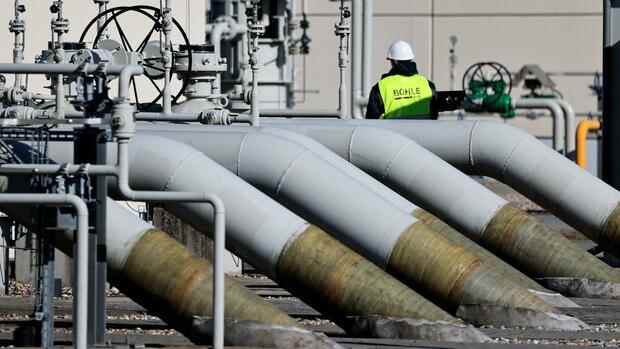Moscow/Berlin The Russian energy group Gazprom is again reducing the gas delivery volumes through the Baltic Sea pipeline Nord Stream 1 to Germany. From Thursday morning only a maximum of 67 million cubic meters will be pumped through the pipeline every day, Gazprom announced on Wednesday afternoon. The Russian state-owned company once again justified this step with delays in repair work. Therefore, another gas compression plant had to be shut down. The gas wholesale price increased significantly.
Gazprom had already announced on Tuesday that it would reduce the previously planned daily volume by around 40 percent from 167 million to 100 million cubic meters of gas per day and pointed to delays in the repair of gas compressors.
The energy technology group Siemens Energy then announced that a gas turbine overhauled in Canada could not currently be returned from Montréal due to the Russian sanctions. The recent reduction to 67 million cubic meters means a throttling of around 60 percent within two days.
According to Federal Minister of Economics Robert Habeck (Greens), Russia wants to cause unrest with the delivery cuts. “The justification given by the Russian side is simply pretended. It is obviously the strategy to unsettle and drive up prices,” said the Green politician in Berlin.
Top jobs of the day
Find the best jobs now and
be notified by email.
“Currently, the quantities can be procured on the market, albeit at high prices. It is currently still being saved,” said Habeck. “The security of supply is guaranteed.” However, the situation is being monitored very closely and there is close communication about the crisis structures. “But the current situation also shows that saving energy is the order of the day. And of course we will also take government measures if this is necessary.” The gas storage facilities in Germany were recently about 56 percent full.
A Uniper spokesman said in the evening that the energy company had received 25 percent less gas than agreed on Wednesday. “We are currently replacing the missing amount with other sources. We are in close contact with the German government.”
For Germany, Nord Stream 1 is the main supply pipeline with Russian gas. The Yamal-Europe line, which runs through Poland, had previously not been filled. The transit of Russian gas through Ukraine is also reduced. Energy prices have increased as a result of the previous restrictions, among other things, because less gas flows from Russia to Europe overall.
>> Read here: 30 percent less than possible: Gazprom supplies significantly less gas through Nord Stream 1
A spokeswoman for Siemens Energy said on Wednesday that a second gas turbine, which is also due for scheduled maintenance in 2022, is still in Russia. The company did not provide any information on when exactly the maintenance of this turbine is planned.
In coordination with the European Commission, it was determined that the maintenance of these systems was not subject to the sanctions, Habeck said on Wednesday, even before the renewed announcement of a further reduction. He personally confirmed this to Siemens Energy. The facilities would be serviced via Canada.
One is talking to the Canadians about the extent to which Canadian sanctions make this possible. As far as we know, the first maintenance tranche, where this would have become relevant, will not be due until autumn, and then not in the dimension of 40 percent, said Habeck. That’s why he had the impression that it was a political decision and not a technical one.
Habeck put the step in a row with the previous suspension of gas supplies to Bulgaria, Poland and Denmark and the sanctioning of Gazprom Germania. The Green politician spoke of a piecemeal or step-by-step approach. The managing director of the industry association Zukunft Gas, Timm Kehler, explained that gas had become a “political pawn”.
Gas wholesale price increases sharply
After the announcement of a further cut, the gas wholesale price rose sharply on Wednesday. On the Dutch trading platform TTF, natural gas to be delivered in July cost 113.8 euros per megawatt hour late on Wednesday afternoon (5:45 p.m.) after 97 euros the day before – an increase of a good 17 percent. On Monday the price was 83.4 euros, on Wednesday a week ago it was 79.4 euros.
>> Read here: German gas storage facilities are already half full
The price fluctuates a lot. On March 7th it was 206.9 euros. A year ago, on June 15, 2021, a megawatt hour of July natural gas cost 18.9 euros. Industry circles have said that Russia is not benefiting directly from the rise in gas prices because it now only serves long-term contracts.
A further throttling of delivery volumes through the Baltic Sea pipeline – to zero – has been known for a few days. The reason given by the operating company was maintenance work. They also took place in previous years during this period. Both lines of the double line will therefore be switched off from July 11 to 21, at 6:00 a.m.
More: Federal government increases control over Gazprom Germania and grants billions
